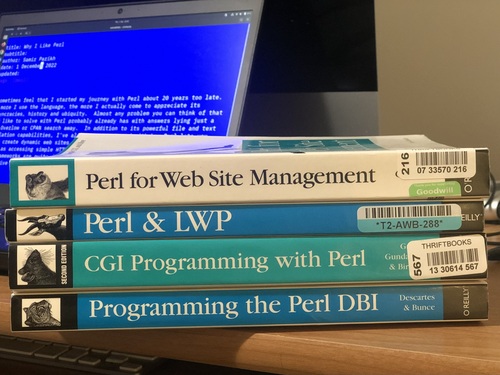
Originally published on 3 December 2022
I sometimes feel that I started my journey with Perl about 20 years too late. The more I use the language, the more I actually come to appreciate its idiosyncrasies, history and ubiquity. Almost any problem you can think of that you’d like to solve with Perl probably already has with answers lying just a Stack Overlow or CPAN search away. In addition to its powerful file and text manipulation capabilities, I’ve also become enamored with how Perl lets you quickly create dynamic web sites using the Common Gateway Interface (CGI) module as well as accessing simple HTTP APIs using the LWP module. Admittedly, both of these frameworks are quite dated and have more modern counterparts but I admire the relative simplicity (or perhaps rawness?) and ambition of scope they provide.
I like how Perl is installed on virtually every Unix- or Linux-based machine and how all of the documentation is available via the powerful perldoc command, even if you don’t have an internet connection or browser.
In addition to the built-in documentation, there are also several really good (but dated) used books you can cheaply buy that walk you through everything from the basics of getting started to more advanced concepts. Two that I have been slowly working my way through include the second edition of “CGI Programming with Perl” by Scott Guelich, Shishir Gundavaram, and Gunther Birznieks and “Perl & LWP” by Sean M. Burke. Two more that I haven’t had a chance to start reading are “Perl for Web Site Management” by John Callender and “Programming the Perl DBI” by Tim Bunce, Alligator Descartes. I think I picked up all four books in nearly mint condition for less than $30, including shipping. There are also books on data munging, bioinformatics, algorithms, network programming and many more topics. Again, most of these are quite old and have probably been made obsolete by newer paradigms but the quality of content in these books can’t be replaced by blog posts or Stack Overflow answers. They serve almost as much as history books, offering a glimpse back into the nascent but exciting days of Unix and the world wide web, as they do technical or reference manuals.

Finally, there is the community. I’ve found helpful people across a variety of sites and forums, including PerlMonks, Reddit, IRC, Usenet and interesting blogs such as Gabor Szabo’s Perl Maven and Mark Garder’s The Phoenix Trap. Ultimately, it’s the people that make a technology and, like more open source projects I’ve encountered, I’ve found this community to be very welcoming and supportive.
I know myself well enough that my dalliances with new interests don’t last long (it wasn’t that long ago that I wrote a similar ode about D) so I’m hoping that this infatuation with Perl is more than a one night stand.